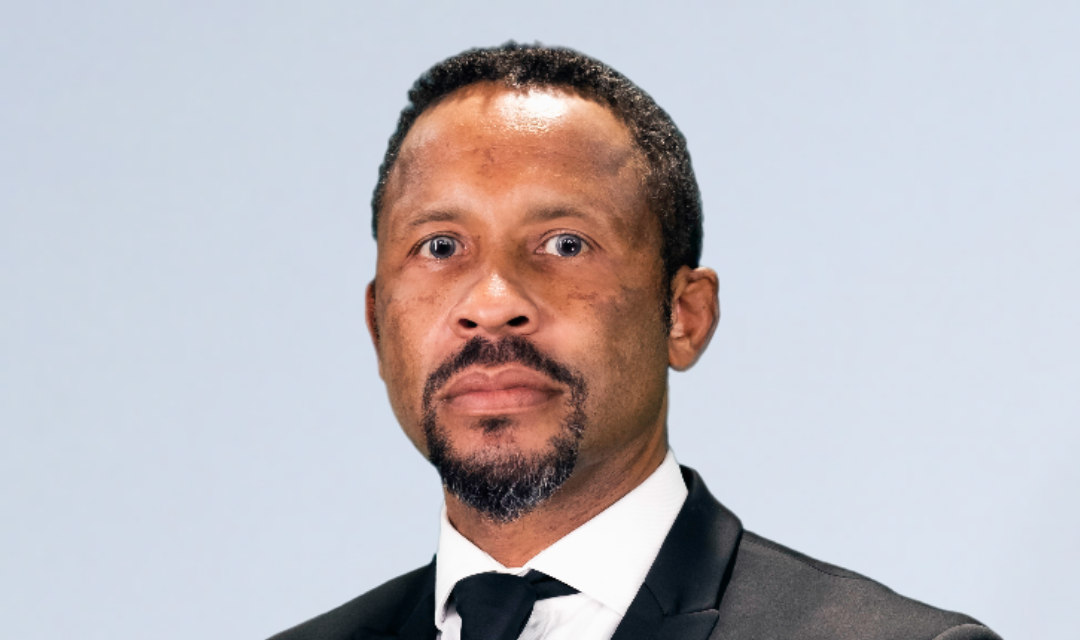WBCPC Scientific Advisory Board (SAB)
The World Bladder Cancer Patient Coalition (WBCPC) established its Scientific Advisory Board (SAB) to strengthen the scientific foundation of our work and ensure that all our efforts are guided by the latest medical knowledge and clinical best practices.
This diverse and global group of experts helps ensure that the voices of patients remain at the heart of everything we do, from developing resources and campaigns to shaping global advocacy initiatives.
The SAB
The Scientific Advisory Board is an independent advisory body composed of world-leading professionals in urology, oncology, radiotherapy, pathology, nursing, and research. Together, they provide guidance and support to WBCPC’s leadership and Board of Directors on scientific and clinical matters.
The SAB plays a key role in:
- Ensuring the scientific accuracy of all WBCPC resources and patient information
- Advising on awareness, education, and advocacy efforts
- Strengthening collaboration between the medical and patient communities
-
Helping WBCPC stay aligned with current clinical best practices in bladder cancer care
Why it matters
The SAB’s insights and expertise are essential in:
- Supporting the credibility and reliability of our work
- Empowering patients with trustworthy information
- Driving evidence-based advocacy for better care
-
Bridging the gap between scientific innovation and lived experience
Meet the Chair and Vice-Chairs
Dr Ashish Kamat, Chair of the WBCPC SAB, is an Endowed Professor of Urologic Oncology and Cancer Research at the University of Texas MD Anderson Cancer Center. His leadership reflects a strong commitment to person-centred care and the global advancement of bladder cancer knowledge.
“It’s an honour to join this group of distinguished experts with whom I share the commitment to improving the lives of people affected by bladder cancer not only in our own communities but across the world. Together, we will work to guide the World Bladder Cancer Patient Coalition’s work through science and clinical expertise towards its collaborative initiatives globally.” – Dr. Ashish Kamat
Alongside Dr. Kamat, the SAB is supported by its Vice-Chairs and Assistant Chair:
Dr Karima Oualla, 1st Vice-Chair, is a medical oncologist with international training and leadership roles in global genitourinary cancer networks.
Prof. Jeremy Teoh, 2nd Vice-Chair, is Associate Professor at The Chinese University of Hong Kong and a leading researcher in innovative surgical techniques and bladder cancer biomarkers.
Dr. Joseph Black, Assistant Chair, is a Urologic Oncology Fellow at the University of Texas MD Anderson Cancer Center in Houston, Texas.
Watch the announcement video
Dive into the story behind the launch of our first Scientific Advisory Board in this exclusive conversation: Ashish Kamat interviews Alex Filicevas, Executive Director of the World Bladder Cancer Patient Coalition, to discuss the creation of the SAB, its mission, and how it will strengthen global bladder cancer advocacy.
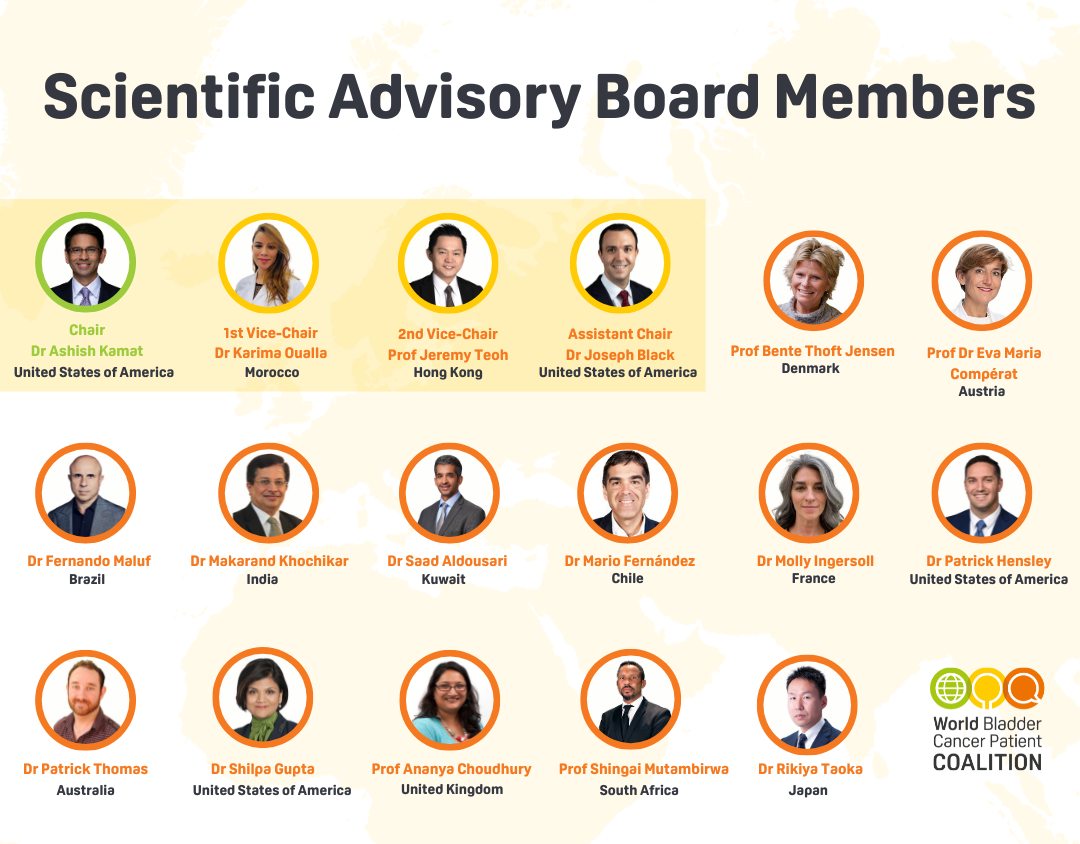
WBCPC Scientific Advisory Board Members
Meet the Experts
Our Scientific Advisory Board includes outstanding medical professionals from around the world. Together, they bring a wealth of experience and a shared commitment to improving the lives of people affected by bladder cancer.
Explore and learn more about each member of the SAB, including their photo, biography, and areas of expertise.
Dr. Ashish M. Kamat is an Endowed Professor of Urologic Oncology (Surgery) and Cancer Research, and the Director of the Bladder Cancer Support Program at University of Texas MD Anderson Cancer Center in Houston. He is the founding President of the International Bladder Cancer Group (IBCG) and serves as the Associate Cancer Center Director at the RFHNH Hospital in Mumbai. Dr. Kamat specializes in genitourinary cancers, with a particular focus on immunotherapy for urothelial cancers. He has led numerous research efforts and clinical trials in this field, resulting in over 610 publications in prestigious journals, textbooks and news articles.
Dr. Kamat’s influence extends globally through his leadership in organizations such as the IBCG, the International Bladder Cancer Network (IBCN), and the Société Internationale d’Urologie (SIU). He actively contributes to organizations including the American Urologic Association (AUA), the Society of Urologic Oncology (SUO), American Society of Clinical Oncology (ASCO), and European Association of Urology (EAU), having served on their boards and played pivotal roles in organizing national and international meetings. Additionally, Dr Kamat serves on advisory boards for research groups, healthcare systems, industry think tanks, and biotech innovators.
A dedicated educator, Dr. Kamat served as Fellowship Director at MD Anderson (2005-2016) and continues to mentor students, residents, fellows, and international visiting scholars, including via the AUA USMART Program. He serves on editorial boards of leading journals including European Urology Oncology, Urologic Oncology, Journal of Urology, Expert Reviews, and leads UroToday’s Bladder Cancer Center of Excellence.
Dr. Kamat deeply committed to patient advocacy. He has received the Compassionate Doctor Award from patient groups and serves on the boards of the Bladder Cancer Advocacy Network (US) and the World Bladder Cancer Patient Coalition (WPBPC), including as inaugural Chair of the Scientific Advisory Board. His contributions have earned him listings in Who’s Who in Medicine and Best Doctors in America. In recognition of his service, the “Wayne B. Duddlesten Professorship in Honor of Dr. Ashish Kamat” was established in 2016 to advance cancer research and education at MD Anderson Cancer Center.
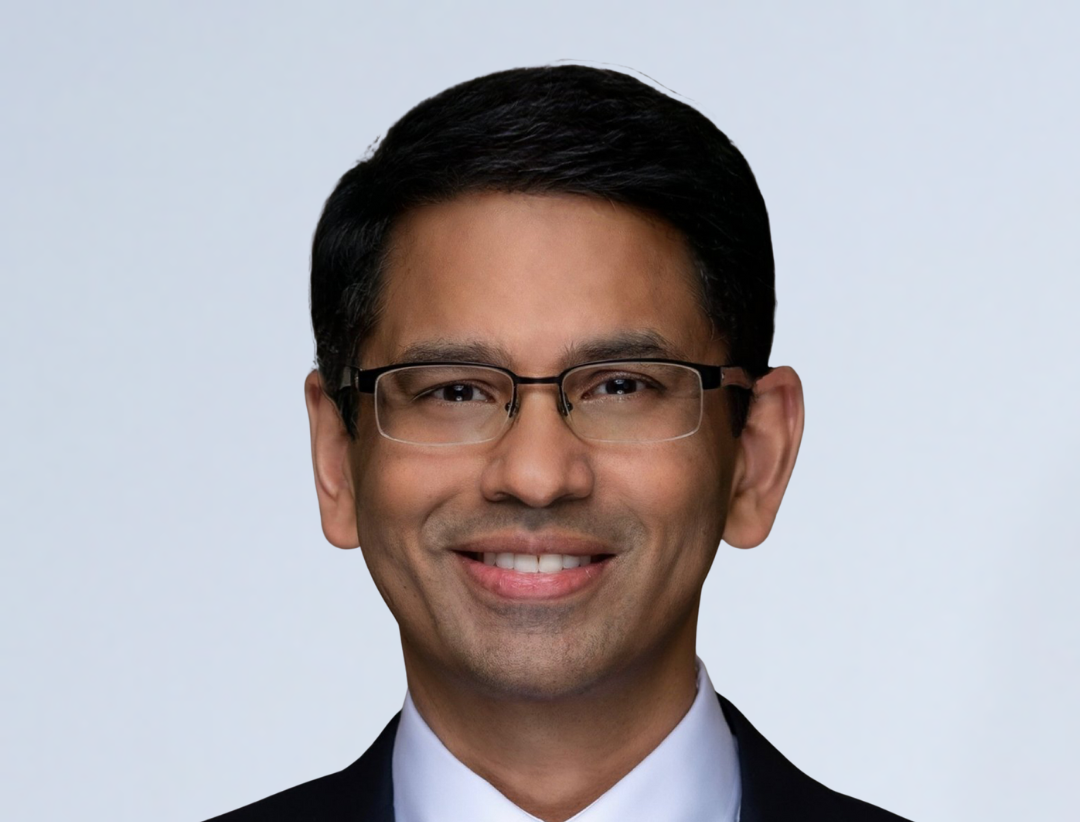
Dr Oualla completed her medical training at University Sidi Mohamed Ben Abdellah prior to practicing as a Medical Oncologist at Hassan II University Hospital. She also earned a degree in epidemiology and clinical research from University Sidi MohamedBen AbdellahthenjoinedInstitut Jules Bordet in Brussels, Belgium, as an assistant doctor (2012–2013).Dr Oualla holds a certificate of specialization in Medical Oncology from the Université Libre de Bruxelles, and completed a 3-year postgraduate course in Medical Oncology (European Organisation for Research and Treatment of Cancer [EORTC]-affiliated National Belgian Programme for Inter-University Faculty).
Dr Ouallawas awarded a fellowship by the European Society of Medical Oncology(ESMO)on Onco-Urologyat the Istituto Nazionale dei Tumori, in Milan, Italywhereshe workedin Onco-UrologyUnit. In 2015, she joined the Cancer Prevention andControl Research Training Programme at the Department of Public Health in theUniversity of South Florida, in Tampa, FL, USA, funded by the National Institutes ofHealth (NIH) Fogarty International Center, Bethesda, MD, USA, and Moffitt CancerCenter, Tampa (2015–2016), where shegraduatedon “Concepts and Tools ofEpidemiology”. In 2016, Dr Oualla undertook transitional research training at theComprehensive Cancer Center (CCC), in Vienna, Austria, and completed an ESMOfellowship in the Palliative Care Department at the Centre Léon Bérard, in Lyon,France, in 2019.
She completed a master’s degree in Science at Ulm University, inUlm, Germany in 2020.Dr Oualla was designated as an ambassador of the European School of Oncology forthe years 2023 and 2024.Dr Ouallaserves on the leadership Council of the Global Society of RareGenitourinary Tumors (GSRGT),and the scientific committee of the InternationalBladder Cancer Group (IBCG). Sheis also member of ESMO,the American Societyof Clinical Oncology (ASCO), the European School of Oncology (ESO).
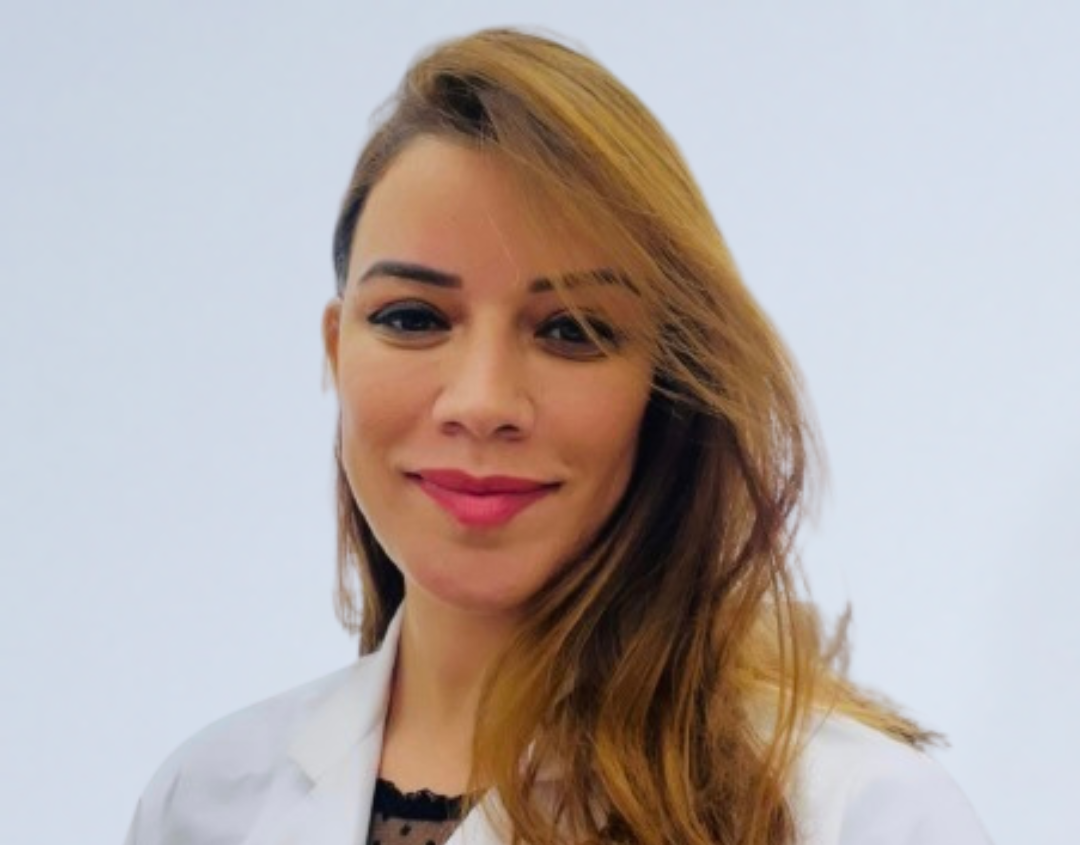
Prof Jeremy Teoh is currently Associate Professor, and the Assistant Dean (External Affairs) of the Faculty of Medicine, The Chinese University of Hong Kong. In 2021, he was awarded the Ten Outstanding Young Persons Award (Hong Kong) and the SIU-Innovators Award. In 2023, he was appointed as an Adjunct Professor at the Medical University of Vienna. In 2024, he was awarded the World Chinese Urological Society Rising Star Award. Jeremy has an immense interest in bladder cancer research. Of note, he conducted a randomised trial comparing between bipolar and monopolar transurethral resection of bladder tumour (TURBT), and showed that bipolar TURBT could achieve a higher detrusor sampling rate than monopolar TURBT. He has also developed a global consensus statement on transurethral en bloc resection of bladder tumour (ERBT).
He also led a multi-centre randomised trial on ERBT, and it was the first multi-centre clinical trial to show that ERBT could reduce the 1-year recurrence rate of non-muscle-invasive bladder cancer (NMIBC) from 38.1% to 28.5%, as compared to TURBT. He is also leading a phase 2 clinical trial investigating the role of modified ERBT for large bladder tumours. Currently, he is heavily involved in the development of urinary biomarkers for bladder cancer, aiming to develop a urine test which can safely avoid the need of cystoscopy in well-selected patients.
Jeremy is also leading a bladder cancer organoid project, aiming to perform drug screening for chemotherapy, targeted treatment and immune-oncology drugs, and finally developing a molecular classification based on treatment response. Jeremy is currently Associate Editor of the European Urology Oncology journal, and a panel member of the European Association Urology (EAU) Guidelines on NMIBC and Upper Tract Urothelial Carcinoma (UTUC).
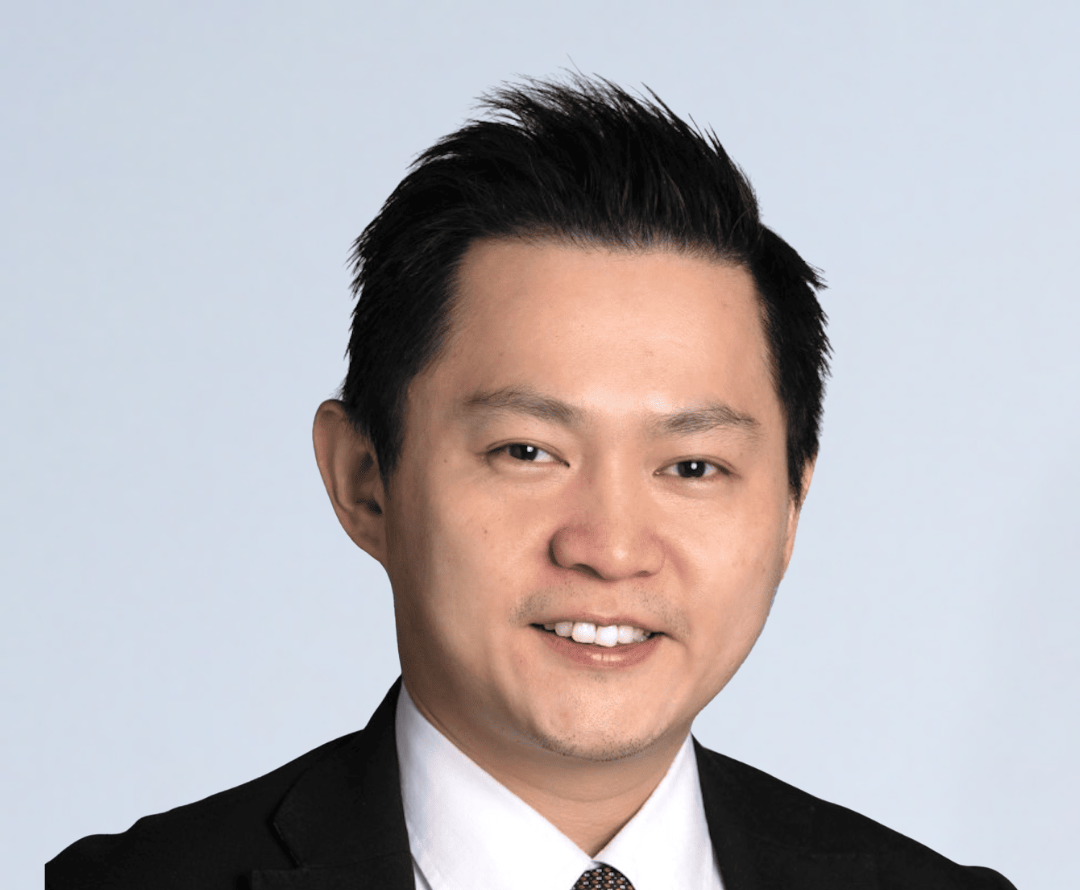
Dr. Joseph Black is a Urologic Oncology Fellow at the University of Texas MD Anderson Cancer Center in Houston, Texas. His clinical and academic interests focus on urothelial carcinoma and the development of bladder-sparing approaches for patients with bladder cancer. He completed his MD-PhD at the University of Florida, where his research investigated the molecular biology of cancer progression in genitourinary malignancies. Dr. Black completed his urology residency at Beth Israel Deaconess Medical Center/Harvard Medical School, where he studied outcome differences between robotic and open radical cystectomy and served on the Graduate Medical Education Trainee Education Council. His current research examines the impact of age on bladder cancer presentation and explores the use of artificial intelligence to enhance patient stratification and predict treatment response.
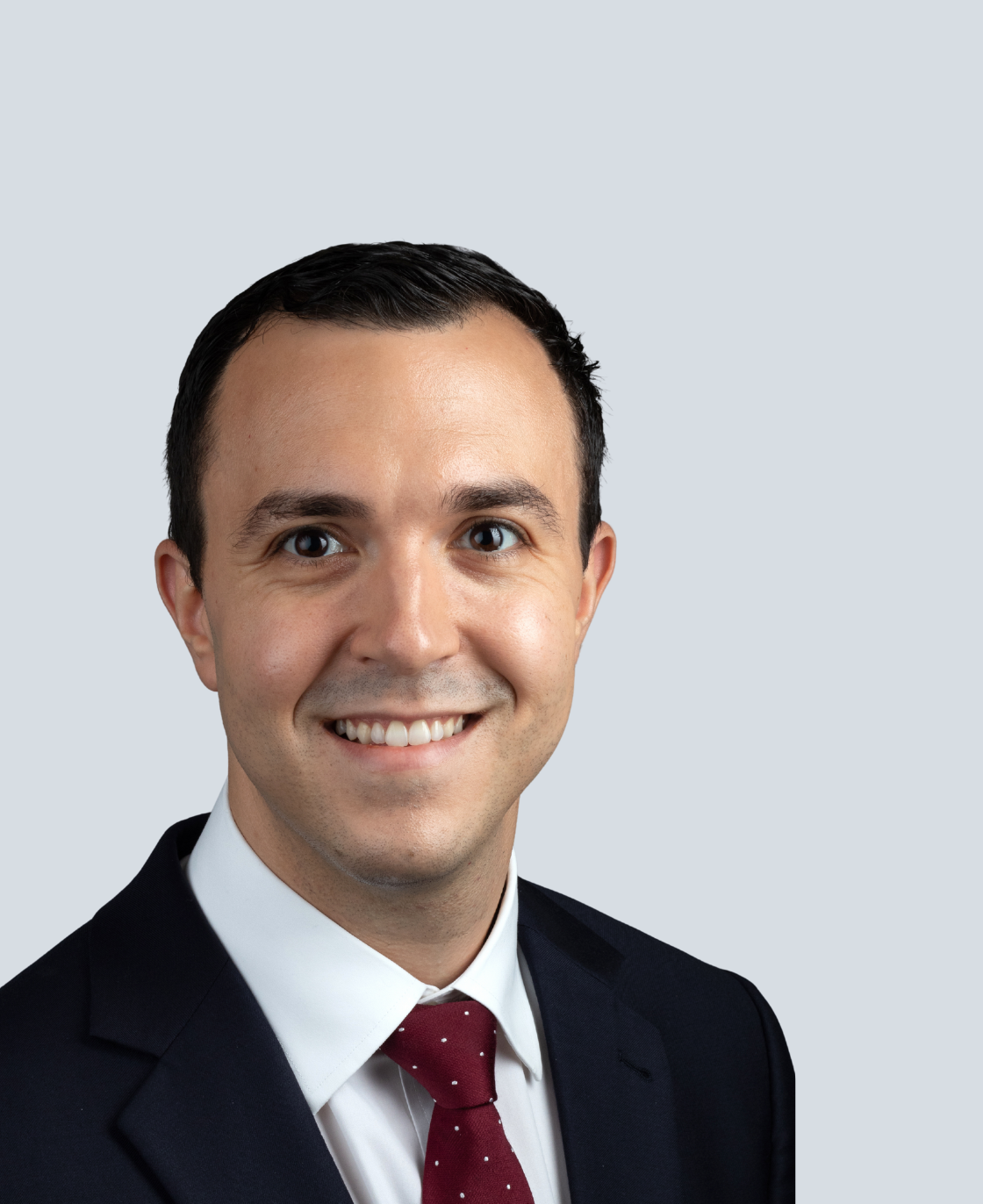
Professor Ananya Choudhury is Chair of Clinical Oncology and Clinical Lead for Advanced Radiotherapy within the Division of Cancer Sciences at the University of Manchester, as well as Honorary Consultant in Clinical Oncology at The Christie NHS Trust, UK.
Professor Choudhury undertakes research that aims to optimise and personalise radiotherapy, using new techniques and imaging technology to deliver high doses while minimising side effects. Her work also focuses on predictive biomarkers to determine which patients will benefit from specific treatments.
She holds national leadership roles within the Royal College of Radiologists and works closely with the National Institute for Health and Care Excellence (NICE). Professor Choudhury is currently the Editor-in-Chief of BMJ Oncology.
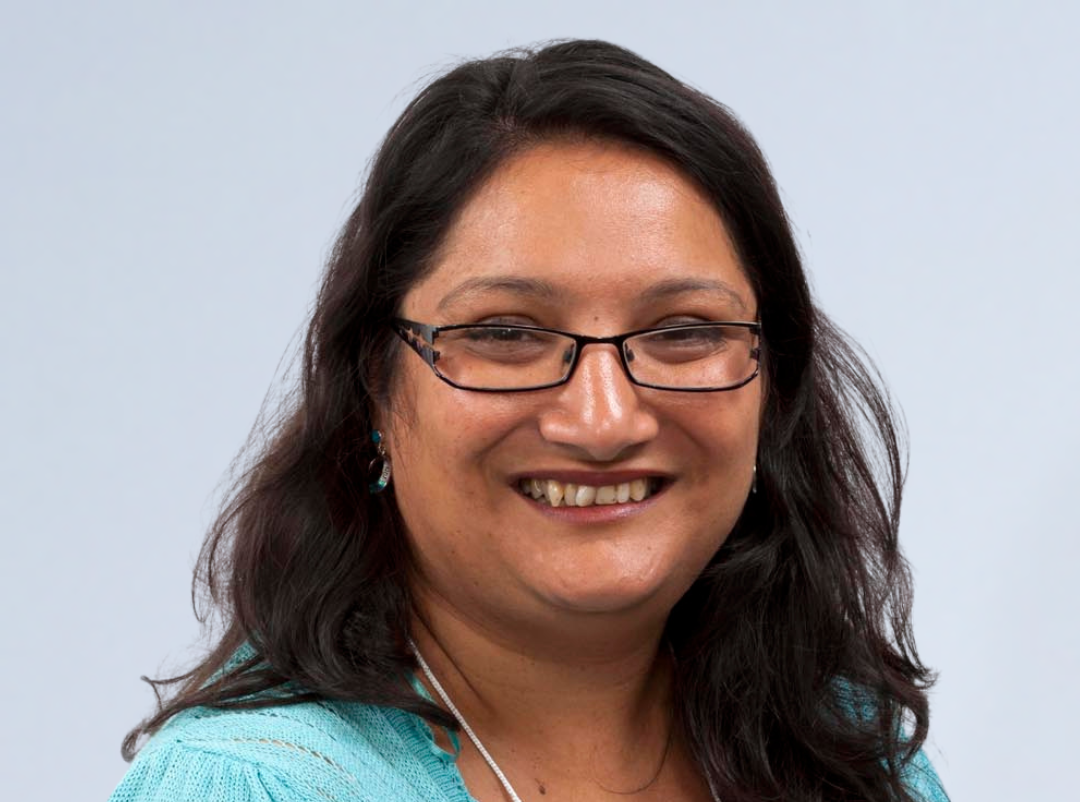
Prof Bente Thoft Jensen is a Clinical Nurse Specialist and Assistant Professor at the Department of Urology, Aarhus University Hospital, and the Department of Clinical Medicine, Aarhus University. She also serves as Section Leader in Prehabilitation at the National Centre of Research in Cancer Surgery (ACROBATIC) in Denmark.
She has been working in urology for over 30 years, in both Copenhagen and Aarhus. In 2015, she completed a postdoctoral fellowship at Memorial Sloan Kettering Cancer Center in New York, United States.
Professor Thoft Jensen has contributed to several European educational initiatives, including the European Bone Health Programme (EONS), the Skeletal Care Academy, the EAUN online Bone Health course, the European Specialist Nurses Organisation (ESNO), and the European School of Urology Nursing (ESUN). She chairs the EAUN Bladder Cancer Special Interest Group, leads the EAUN Guidelines Group, and is a member of the Patient Information Office of the European Association of Urology (EAU).
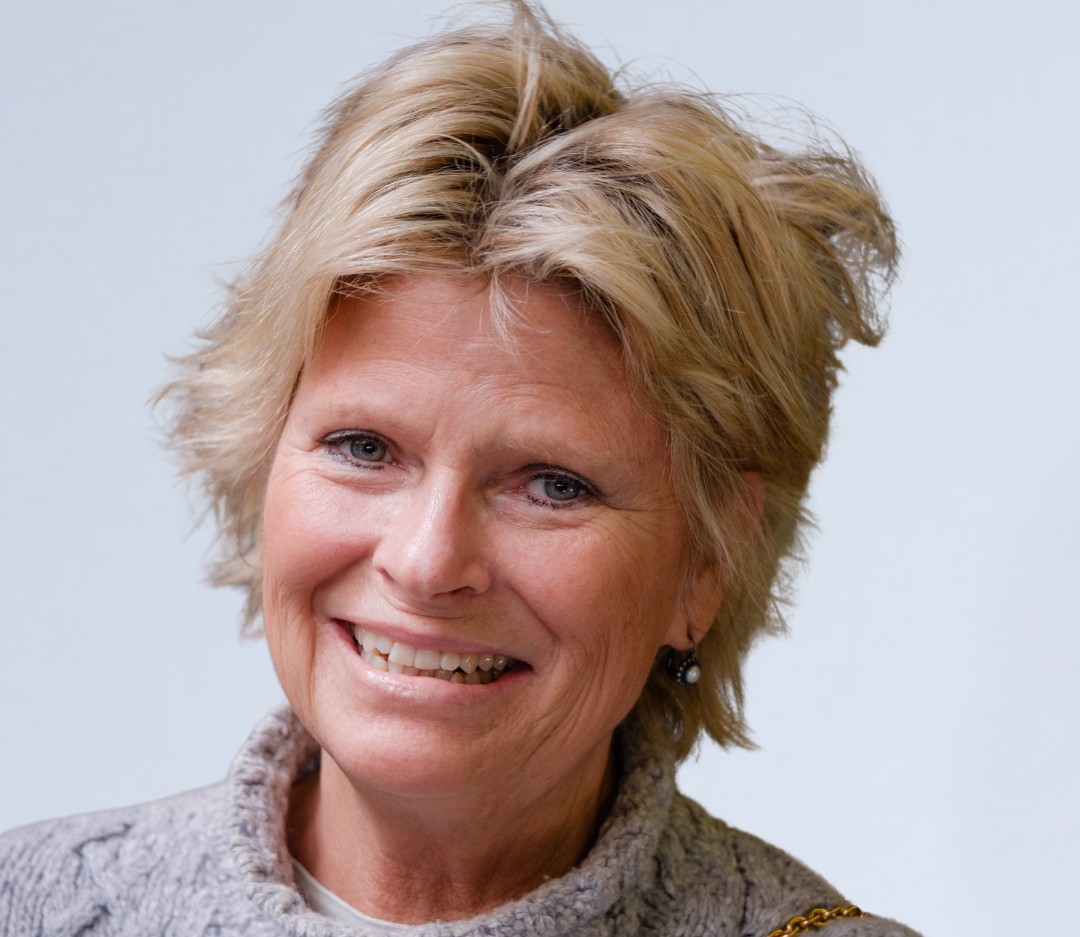
Prof. Dr Eva Maria Compérat is a renowned professor of Urologic Pathology at the Medical University of Vienna and the Head of the Department of Pathology at the Hôpital Tenon, Sorbonne University in Paris. She has made significant contributions to the field of Uropathology and has published several works in this area. Her research focuses on bladder cancer/urothelial carcinomas and the early events of bladder cancer development, upper urinary tract carcinomas, prostate cancer, and kidney cancer.
Dr Compérat, along with her research group at Sorbonne University and in collaboration with the Medical University of Vienna, is currently working on investigating the microenvironment of prostate cancer as well as predictive and prognostic markers in prostate cancer. This study aims to spare patients from radical prostatectomy.
Dr Compérat is a well-known European Association of Urology (EAU) member and a board member of the Austrian Society of Pathology (ÖGP). Since 2021, she has served on the editorial board of Nature Reviews Urology and other editorials. One of her significant works is published in the WHO 5th 2022 Ed as a co-author and responsible author of several chapters.
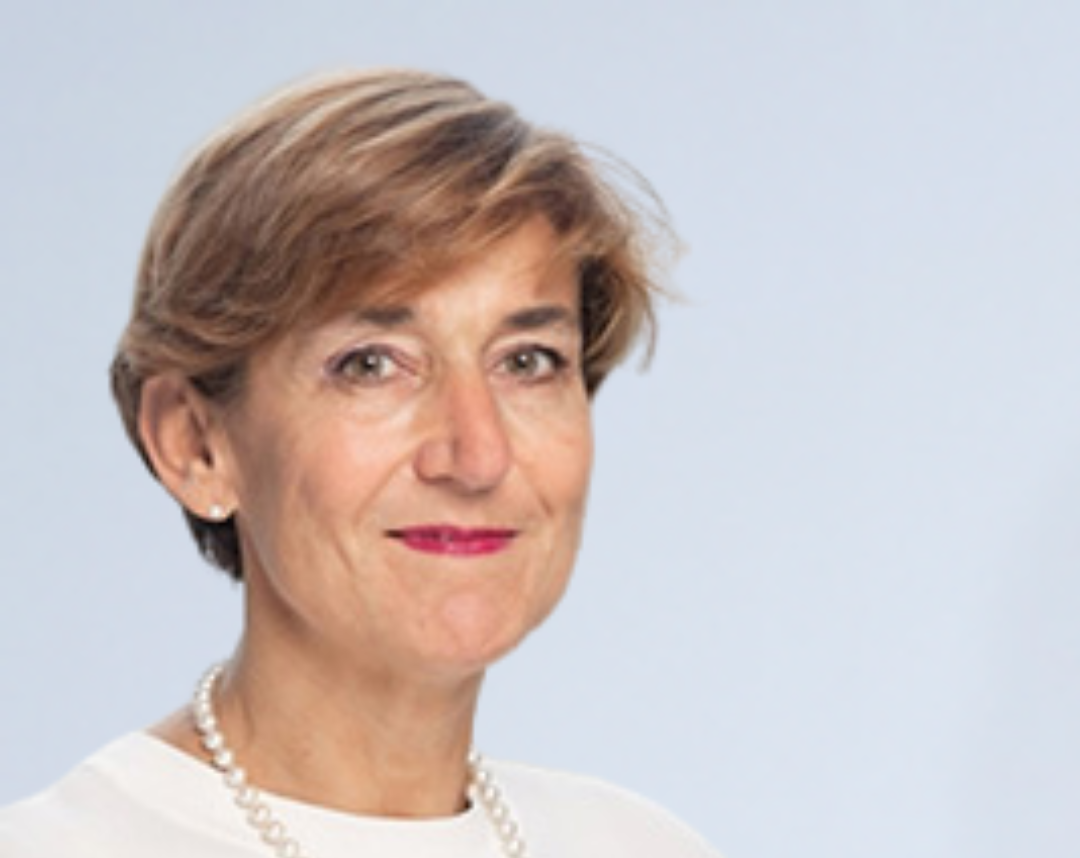
Dr Fernando Maluf, MD, PhD, is Director of Medical Oncology at Beneficência Portuguesa and a member of the steering committee of the Medical Oncology Centre at Albert Einstein Hospital in São Paulo, Brazil.
He is a member of the American Society of Clinical Oncology and a founding member of the Brazilian Group of Gynaecological Tumours (Grupo Brasileiro de Tumores Ginecológicos). Dr Maluf has authored numerous publications and currently serves as an editor for the Brazilian Oncology Manual.
In December 2018, he was awarded the academic title of Professor Livre-Docente by the Faculty of Medical Sciences of Santa Casa de São Paulo.
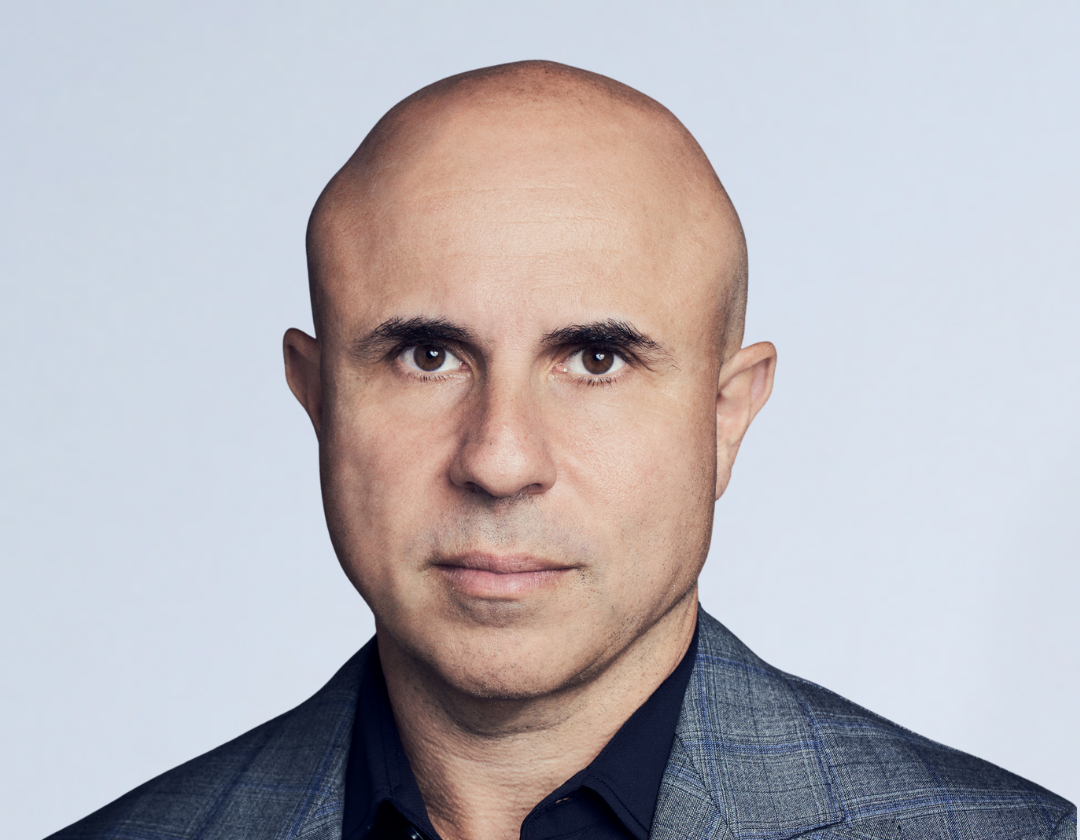
Dr Makarand Khochikar is a world renowned Urologic Oncologist with a vast experience of 30 years. He was trained in Mumbai and Nadiyad for Urology (1989-1992) and had further specialty training in London and Cambridge (1993-1998). He returned to India in 1998 and did pioneering work in establishing Urologic Oncology as a sub-specialty and has made his presence felt nationally and internationally through his exemplary work.
Dr Khochikar has an outstanding and glorious career. He won Six Gold Medals during his MBBS and MS examinations and has been the recipient of Schering Prize and a Gold Medal for Dip.Urol exam at University of London in 1995. The career graph continued to rise further and has 12 Gold medals to credit including Urology Gold Medal by Urological Society of India -WZ.
He has published widely and has been invited as a visiting faculty and a guest speaker to more than 55 countries, has delivered 12 prestigious orations, more than 200 guest lectures on various platforms across the globe. He has served on editorial boards of many international Urology Journals and has won Best Reviewer’s award by BJUI and IJU.
He is lauded for his extraordinary surgical skills in performing nephron sparing surgeries, constructing the neobladders and challenging post chemo RPLNDs for the testicular cancer. He has the largest individual series of treating variety of adrenal tumors in India.
Walking on the path usually less travelled, he has done exemplary work on Urological cancers in pregnancy, hereditary renal cancers and oncofertility. He passionately works for Wilms’ tumor foundation – a support group he started 25 years ago. He is a founder member of the recently launched first pheochromocytoma-paraganglioma foundation (PPGF) in India. Dr Khochikar has served as a President of Urological Society of India -West Zone .He has been closely associated with SIU since 1996, and has served as a National delegate and Board of Directors of SIU in the past and has contributed immensely towards SIU teaching activities and SIU academy.
Dr Khochikar has been recently decorated with Inspiring Urologist of India ( 2024 ) by Times Now and has featured in prestigeous Forbes magazine and The WEEK for his extraordinary work in urologic oncology.
He has been awarded with ‘Distinguished Career Award ‘ in 2024 by Society International Urology ( SIU) – a global organisation of of 180 countries and as latest as in March 2025 , USANZ ( Urological Society of Australia and New Zealand) decorated him with Honorary membership of their society , a truly prestigeous and exclusive honor .
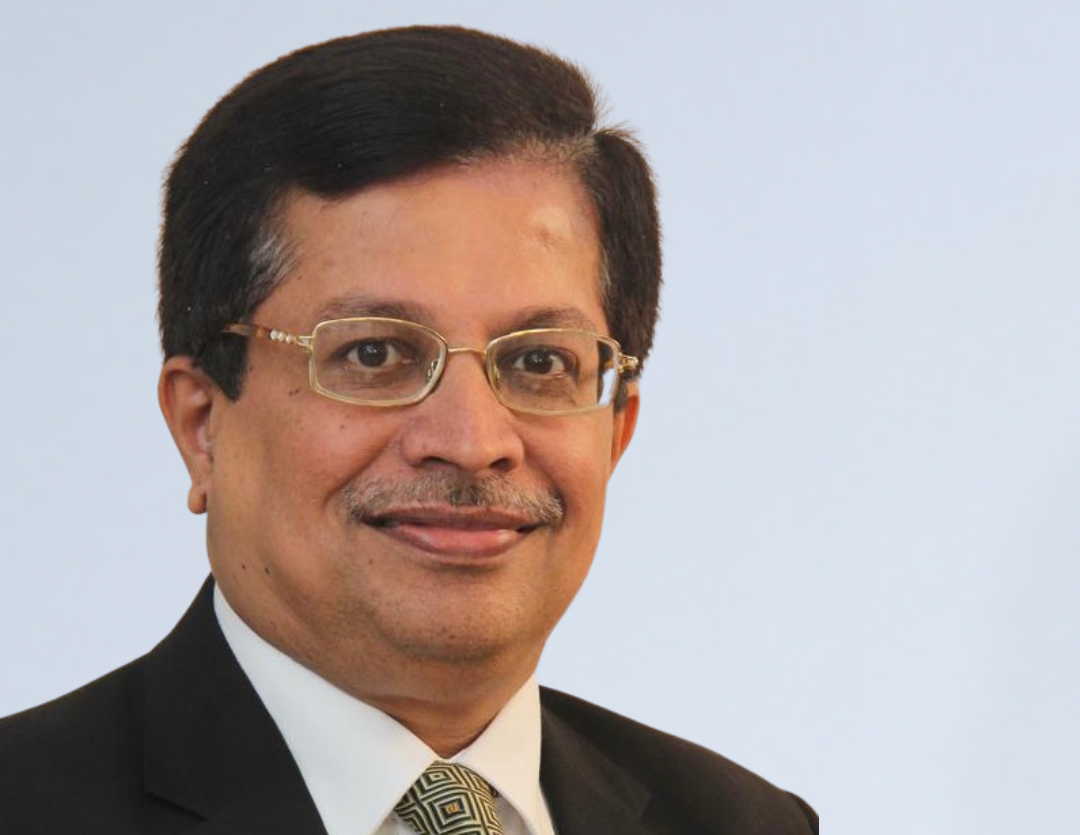
Dr Mario I. Fernández, MD, is Associate Professor in the Department of Urology at the Faculty of Medicine, Clínica Alemana Universidad del Desarrollo in Santiago, Chile.
He serves on the Board of the Sociedad Chilena de Urología, is Editor-in-Chief of Revista Chilena de Urología, and leads the Bladder Cancer Working Group of the Latin American Urological Confederation (CAU). He is also a member of the IBCG Core Committee. Dr Fernández serves on the editorial boards of Bladder Cancer and Journal of Urology Open Plus, and is a reviewer for over 20 international journals.
His research focuses on genetic susceptibility, epidemiology, carcinogenesis, and clinical and molecular prognostic factors in urothelial tumours, with particular attention to arsenic-related bladder cancer in Northern Chile.
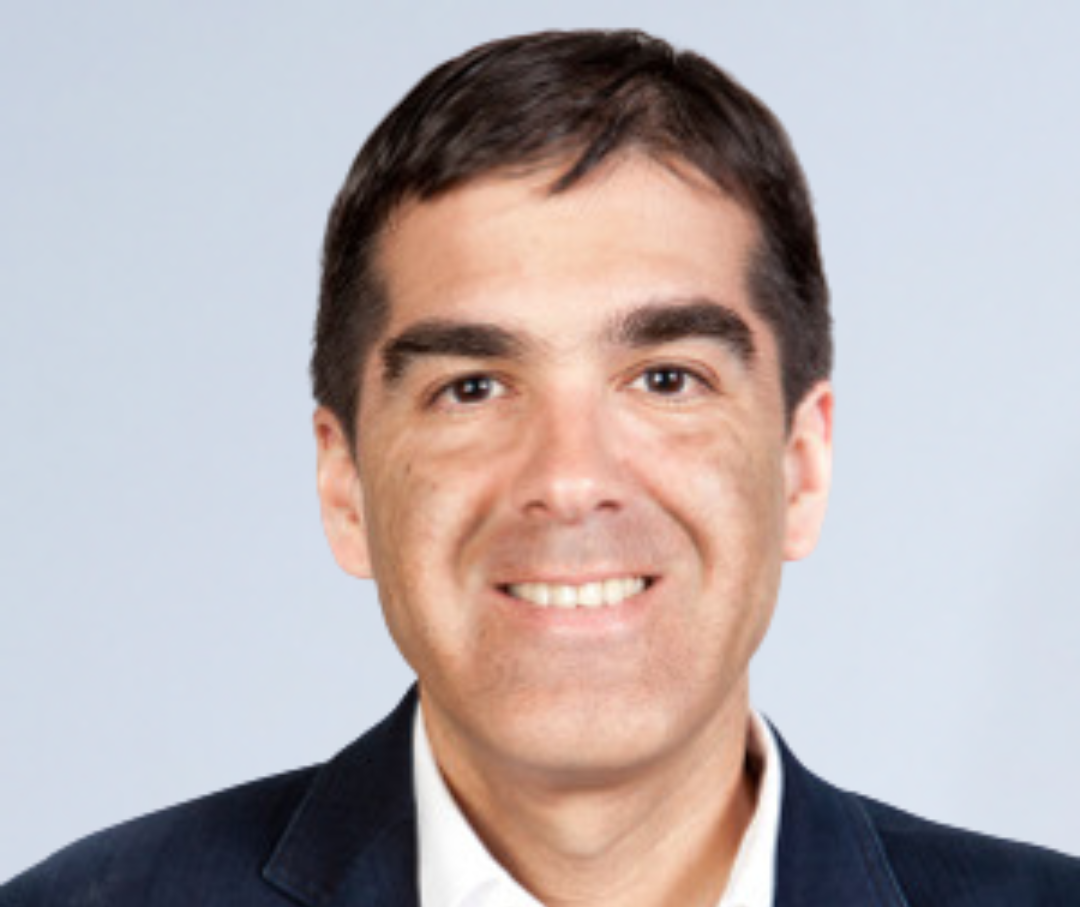
Dr Molly Ingersoll received her PhD from NYU School of Medicine, where she studied host–pathogen interactions with Arturo Zychlinsky at both NYU and the Max Planck Institute for Infection Biology in Berlin, Germany. She completed a brief postdoctoral fellowship at Washington University School of Medicine in St Louis, Missouri, focusing on innate immunity to urinary tract infections with Scott Hultgren, followed by a postdoctoral appointment at Mount Sinai Medical Center in New York City, where she investigated monocyte and dendritic cell biology.
Dr Ingersoll is currently a Research Director with a joint appointment at Institut Cochin and Institut Pasteur in Paris. Her team explores mucosal immunity in the bladder in the context of infection and cancer, with a focus on understanding the influence of biological sex on bladder responses to both infectious and non-infectious inflammatory diseases. She aims to develop immunomodulatory strategies to improve disease outcomes.
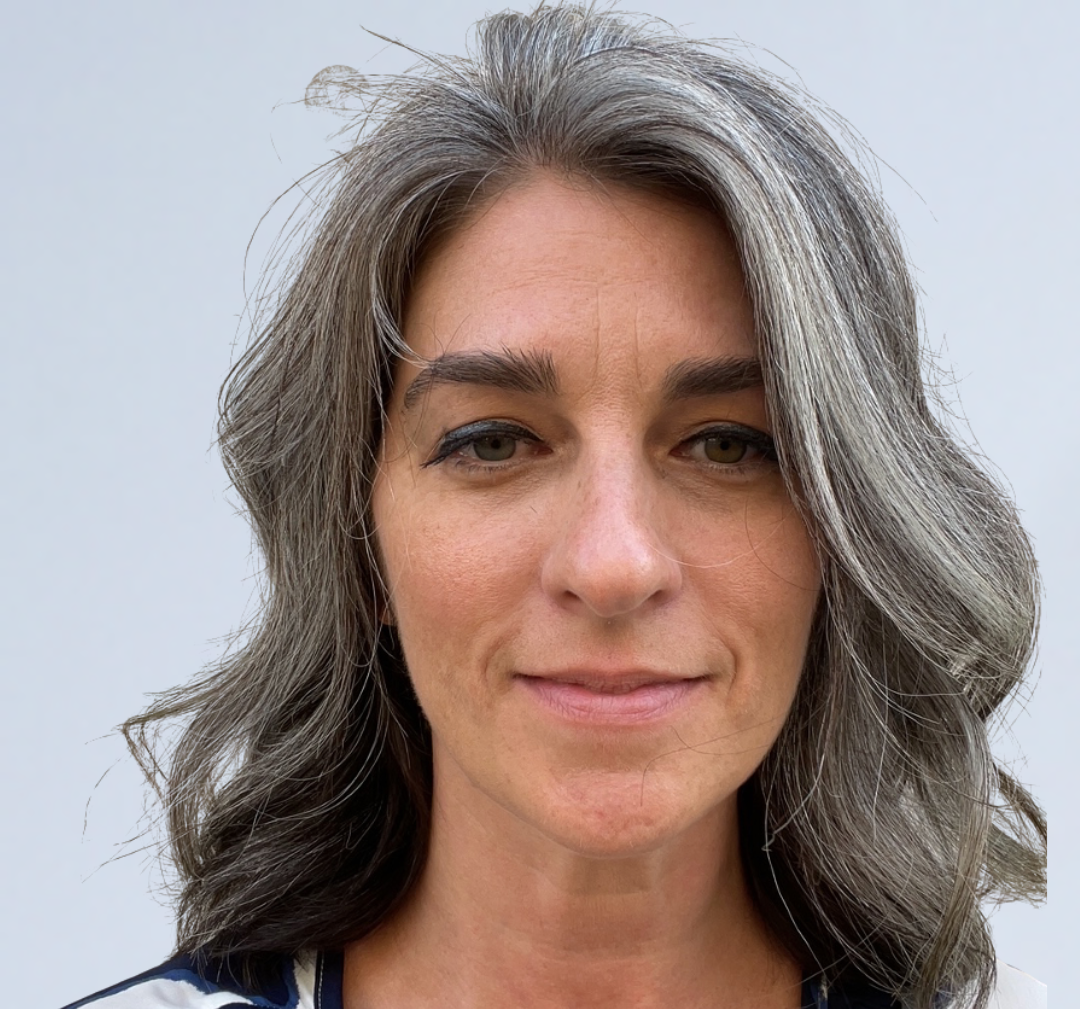
Dr Patrick Hensley is an Assistant Professor in the Departments of Urology and Pathology at the University of Kentucky College of Medicine in Lexington, Kentucky. He completed a Society of Urologic Oncology (SUO) fellowship in Urologic Oncology at the University of Texas MD Anderson Cancer Center. His clinical and academic focus is on urothelial carcinoma of the bladder and upper tract.
Dr Hensley’s research centres on predictive biomarkers in the muscle-invasive setting and approaches to bladder preservation. He serves on the Board of Directors of the International Bladder Cancer Group and leads research, clinical trials, and advocacy efforts aimed at improving care and outcomes for people living with bladder cancer.
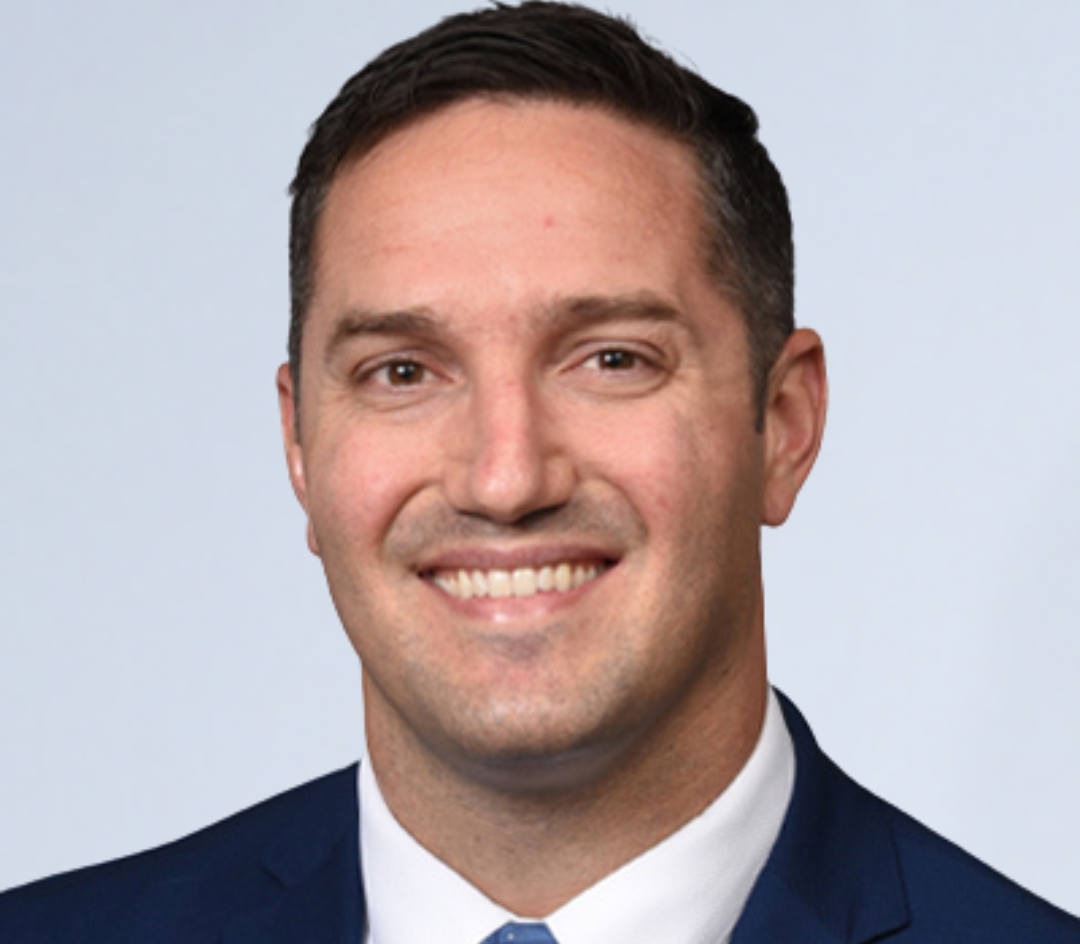
Dr Patrick Thomas is an Affiliate Research Fellow within the Queensland Bladder Cancer Initiative (QBCI) at Queensland University of Technology, Australia. His research focuses on urological cancers and tumour immunology, with the goal of developing precision medicine tools to predict therapy response in bladder and prostate cancer patients.
His work centres on multiparametric immunophenotyping of tumour-localised immune cells, co-culture models for therapy prediction, and spatial profiling of high-risk and aggressive variants of bladder cancer. He has received over 12 national and international awards for excellence in cancer research and currently serves as Scientific Director of the Ron Monaghan Foundation.
Dr Thomas is also a passionate advocate for improving the lives of bladder cancer patients. He champions greater research funding and the translation of emerging scientific concepts into community-focused initiatives. His work aims to bridge the gap between cutting-edge research and real-world patient outcomes, ensuring that advances in precision medicine and immunotherapy reach those who need them most.
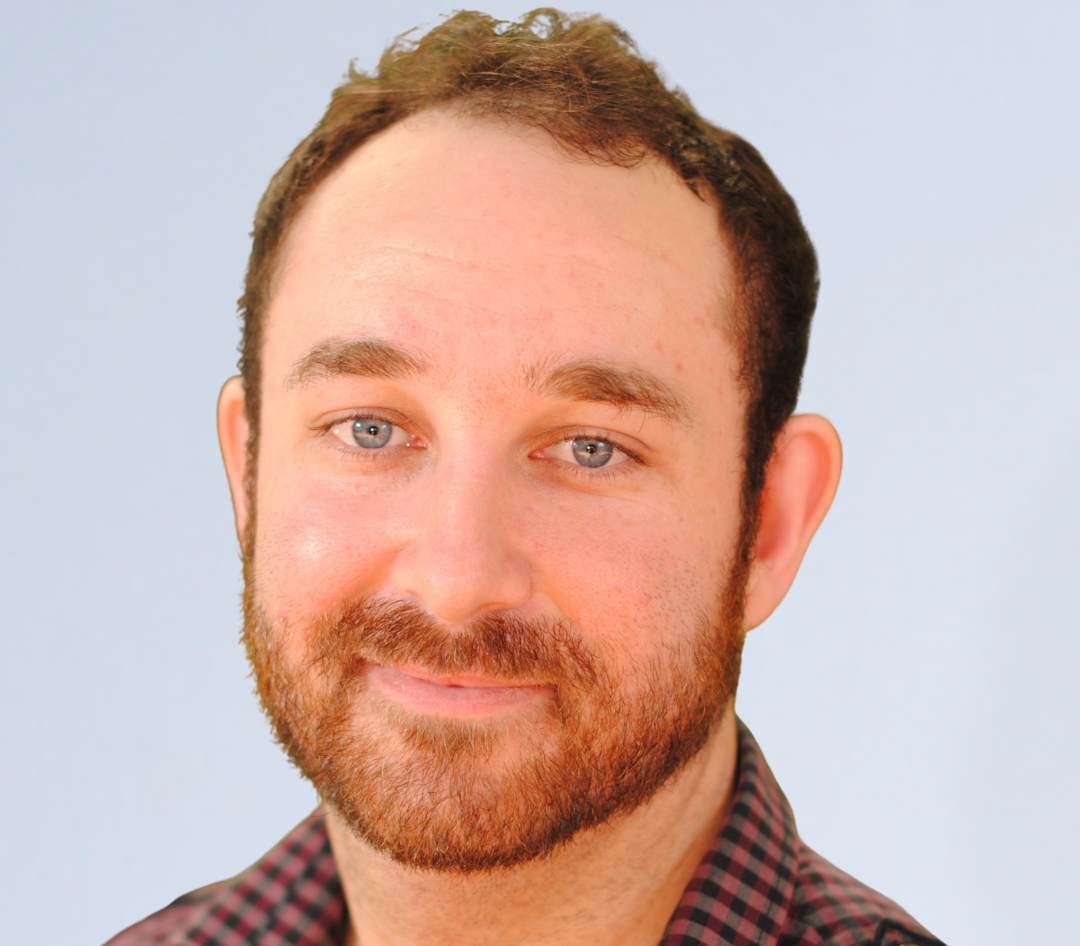
Dr. Rikiya Taoka is an Associate Professor in the Department of Urology at Kagawa University. He earned his MD in 2001 and PhD in 2005, both from Kagawa University.
His academic career includes notable roles such as Assistant Professor at Kagawa University, Assistant Head Physician at Kurashiki Central Hospital, and Assistant Professor at Hyogo College of Medicine. He also served as a Visiting Assistant Professor at MD Anderson Cancer Center from 2013 to 2015.
Dr. Taoka has been recognized with several awards, including the Japanese Urological Association Annual Meeting Award (2004) and two awards from the West Japanese Urological Association (2015, 2020).
His research focuses on urothelial cancer, cancer biology, and glycobiology.
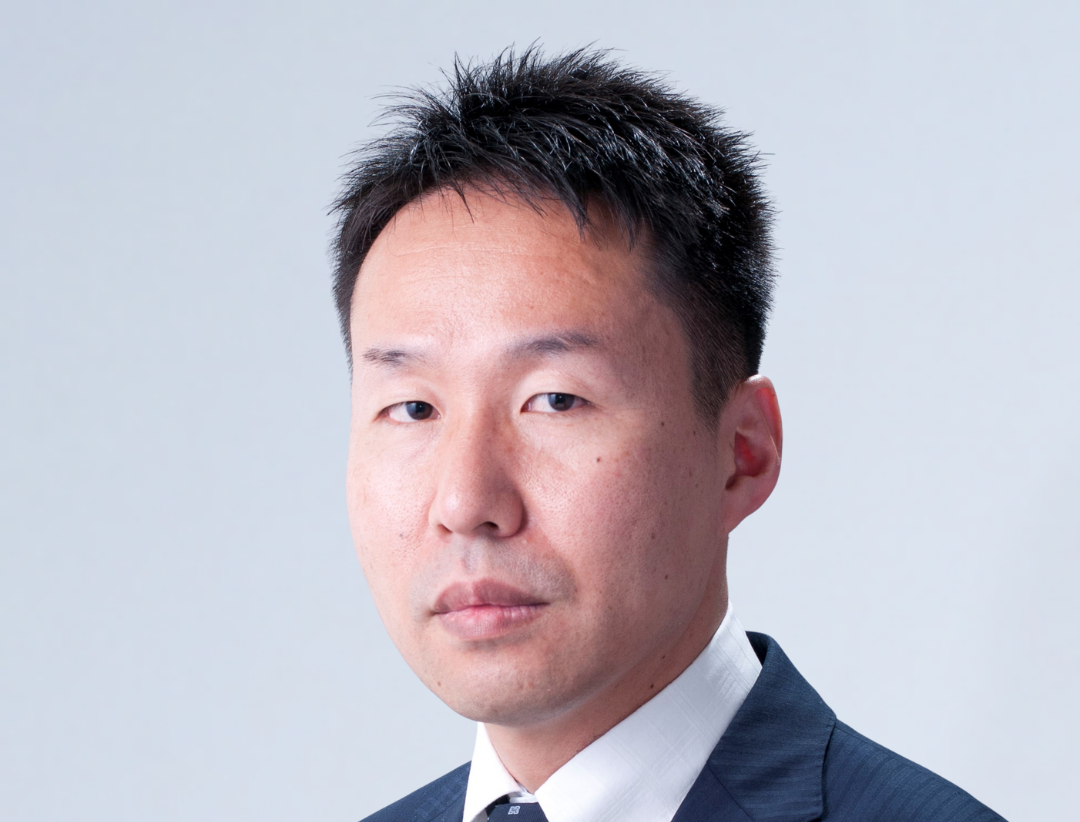
Dr Saad Aldousari is Chairman of the Department of Surgery at Sabah Al-Ahmad Urology Center (SAUC), a tertiary referral centre for adult and paediatric urology patients. He is currently an Associate Professor in the Department of Surgery (Urology Division) at Kuwait University, and an Adjunct Associate Professor in the Department of Urology at MD Anderson Cancer Center in Houston, Texas, USA.
Dr Aldousari obtained his MBBCh degree from the Royal College of Surgeons in Ireland in 2003. He completed his residency training at McGill University in Montreal, Canada, in 2011, followed by a Society of Urologic Oncology (SUO) fellowship at MD Anderson.
He has been involved in the Kuwait Urology Residency Training Programme since 2013, serving as Chair of the Urology Examination Committee from 2016 to 2019, and as Head of the Urology Faculty and Residency Programme from 2019 to 2024. Dr Aldousari is also President of the Kuwaiti Association for Robotic Surgeons.
His research interests include prostate and kidney cancer. His clinical practice focuses on general urology and uro-oncology, with a particular interest in advanced robotic surgery.
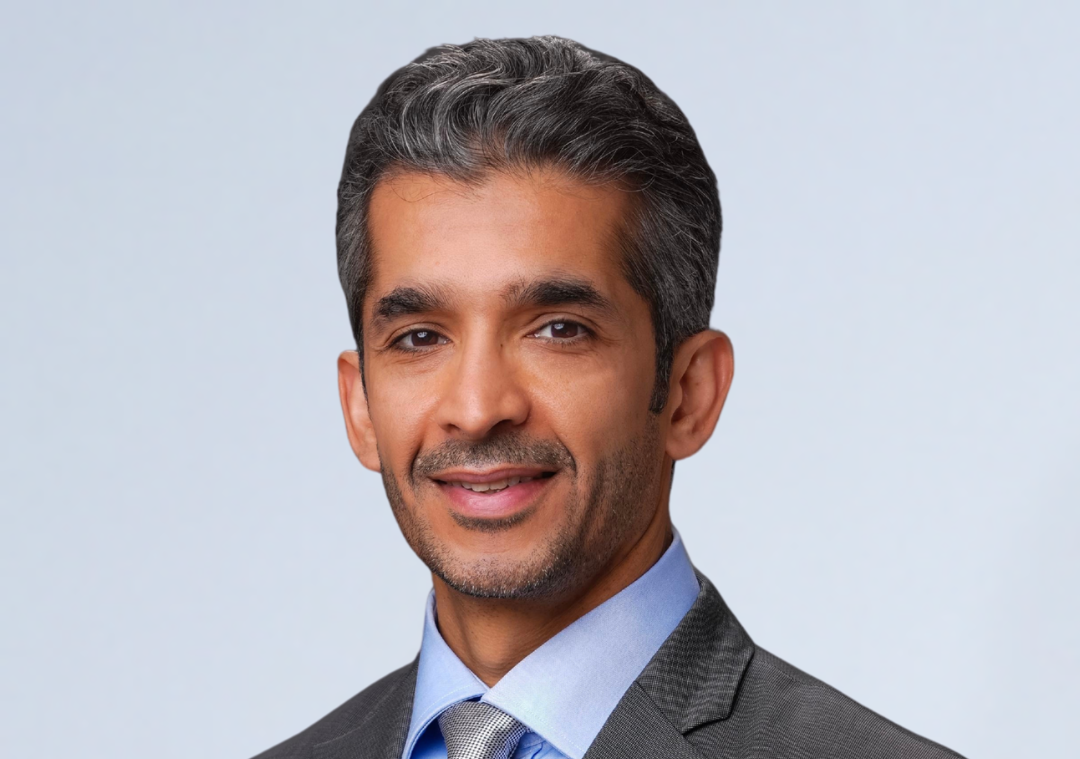
Dr Shilpa Gupta is the Director of Genitourinary Medical Oncology at the Taussig Cancer Institute and Co-Leader of the Genitourinary Oncology Program at Cleveland Clinic. She obtained her medical degree from Lady Hardinge Medical College in New Delhi, India, and completed her residency in Internal Medicine at the University of Connecticut Health Center.
Dr Gupta completed fellowships in Haematology-Oncology and Genitourinary Oncology Translational Research at Thomas Jefferson University. She has held faculty positions at the H. Lee Moffitt Cancer Center and Research Institute and the Masonic Cancer Center, University of Minnesota. Her research focuses on novel drug development and understanding biomarkers of response and resistance in bladder cancer. She leads several NCI trials and is Principal Investigator for the Department of Defense Idea Award on immunotherapy biomarkers in bladder cancer.
Dr Gupta is an active member of professional organisations, including ASCO, AUA, AACR, SITC, and BCAN. She serves on key committees, such as the ASCO Annual Scientific Committee for Genitourinary Cancers and the SITC Anti-PD-1/PD-L1 Resistance Task Force.
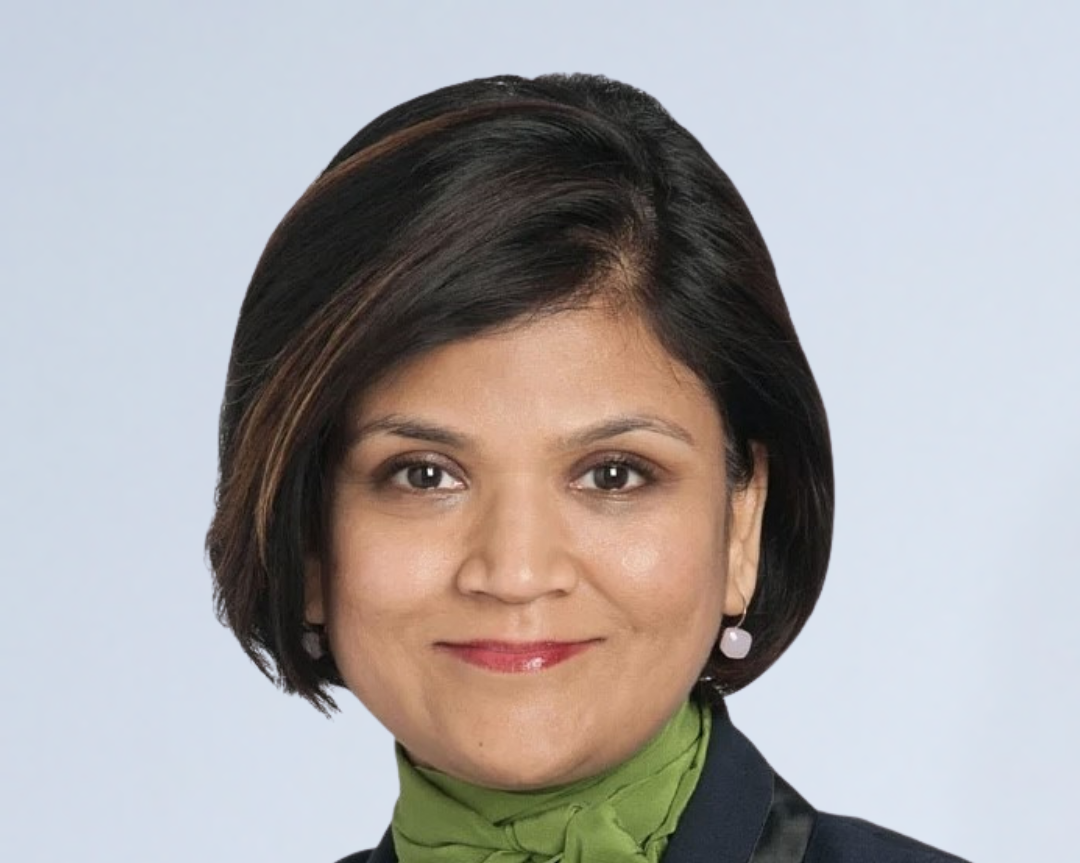
Prof Shingai Mutambirwa is Head of the Department of Urology at Dr George Mukhari Academic Hospital and Sefako Makgatho Health Sciences University in Pretoria, South Africa, a position he has held since 2008. He holds an MMed (Urology) from Medunsa and an FCS (Urol) degree. Prof. Mutambirwa is actively involved in teaching and research, participating in both university-led and industry-driven projects.
He is a founding member of the Prostate Cancer Foundation of South Africa and serves on several academic and professional boards, including Chair of the Academic Committee for the Colleges of Medicine of South Africa (CMSA) and the South African Urological Association. He also contributes to multidisciplinary cancer teams and is a member of organisations such as the African Society of Sexual Medicine and the Continence Association of South Africa.
Prof Mutambirwa has published over 80 peer-reviewed articles and 10 book chapters and serves as a reviewer for leading journals including The Journal of Urology and The African Journal of Urology.
